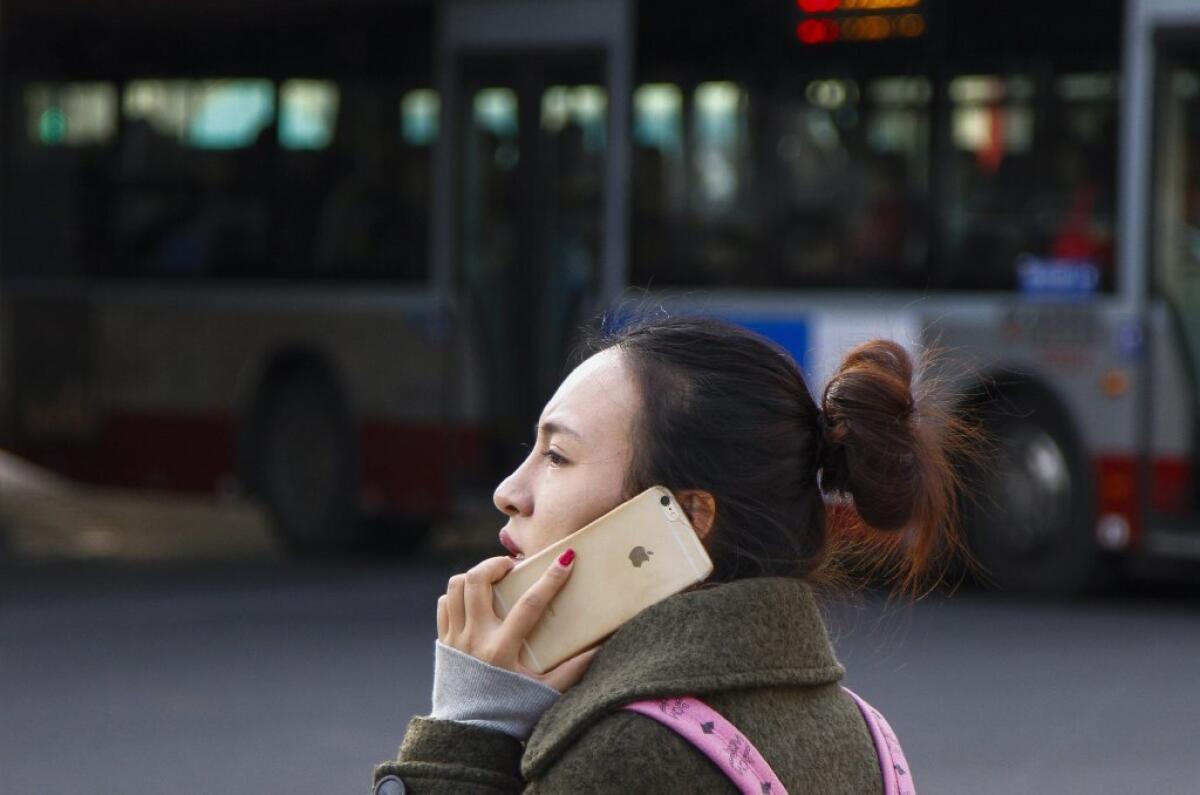Why Apple’s fight with the FBI could have reverberations in China

If Apple is forced to comply with FBI demands, it could bolster recent efforts by countries such as China to curb its citizens’ privacy in the name of national security. Above, a pedestrian in Beijing.
It’s a battle that on its face appears to pit one of the biggest tech companies in the U.S. against the country’s most powerful law enforcement agency.
But the outcome of Apple’s standoff with the federal government over encryption could reverberate across the world, giving authoritarian governments reason to expand surveillance and challenging the U.S. tech industry’s ability to compete globally, technology experts and lawmakers say.
Apple is resisting a federal judge’s order that it build special software to unlock an iPhone used by one of the San Bernardino terrorist attackers.
See more of our top stories on Facebook >>
But if the company is forced to comply, it could bolster recent efforts by countries such as China to curb its citizens’ privacy in the name of national security.
“This completely undermines privacy overseas and if the administration thinks this precedent wouldn’t be used by China, Russia and others then they are in serious error,” said Nicholas Weaver, a senior researcher at the International Computer Science Institute at UC Berkeley.
The White House has told Beijing that it has major concerns about its new counterterrorism law, a somewhat vague piece of legislation that may require American companies to hand over encryption keys and provide backdoor access to their computer systems.
“This is something that I’ve raised directly with President Xi,” President Obama told Reuters last year. “We have made it very clear to them that this is something they are going to have to change if they are to do business with the United States.”
Those demands will be harder to make if the federal government succeeds in getting Apple to give up its fight, according to one of the Senate’s leading voices on technology policy.
“This move by the FBI could snowball around the world,” said Sen. Ron Wyden (D-Ore.), a member of the U.S. Senate Select Committee on Intelligence. “Why in the world would our government want to give repressive regimes in Russia and China a blueprint for forcing American companies to create a back door?”
Doing so, the senator said, wouldn’t just result in further suppression of individuals in those countries, but also a rise in theft of U.S. trade secrets.
“It would be the go-to option for securing information,” Wyden said of a decryption key.
Apple has already reportedly agreed to comply with some Chinese security checks to ensure its devices aren’t accessible to U.S. authorities, but it’s unclear how far that goes.
The company, which did not respond to a request for comment, has been accused by Chinese state media of giving up user data to U.S. intelligence agencies. Chief Executive Tim Cook remains adamant it has never provided a back door for any government agency.
China is particularly treacherous territory for the Cupertino, Calif., company. It’s currently Apple’s second-largest market, responsible for more than a fifth of its revenue, and is expected to grow.
However, it’s complicated by an opaque legal system and a nationalistic sentiment that could turn on foreign companies deemed unsupportive of China’s interests.
Should an iPhone belonging to a suspected terrorist from China’s fractious Xinjiang province require decryption, Beijing, along with popular opinion, wouldn’t afford Apple the ability to argue its case like it’s doing in the U.S.
“Apple has recourse to fight the request through an independent judiciary and Tim Cook feels confident that he can argue publicly against the U.S. government request without fear that Apple’s business will be materially damaged by a retributive government,” said Bill Bishop, an entrepreneur and leading China watcher formerly based in Beijing.
Technology companies have long struggled to balance security and privacy with the demands of foreign governments.
Yahoo was admonished by U.S. lawmakers nearly 10 years ago for outing Chinese dissidents through their email accounts.
SIGN UP for the free California Inc. business newsletter >>
Microsoft, the target of an anti-monopoly probe in China, recently announced a joint venture with a Chinese firm to supply a customized version of its Windows 10 operating system aimed at tackling rampant piracy of its software there.
BlackBerry continues to negotiate with the government of Pakistan after it rebuffed an order to provide customer emails and chats.
And authorities in Brazil briefly shut down Facebook’s WhatsApp messaging app last December for not cooperating in a criminal investigation. The service was quickly returned after a public outcry.
When it comes to doing business abroad, tech companies are being squeezed on both sides: If they don’t give up access to user data, they risk angering governments. But if they are perceived as selling products that aren’t secure, consumers won’t buy them. And that hurts the all-important bottom line.
Forrester Research estimates American cloud computing firms will lose global sales of up $180 billion by the end of this year because of the chilling effect of Edward Snowden’s National Security Agency leaks in 2013.
If American smartphone brands are thought to be compromised, it wouldn’t just hurt Apple, but also Google (now Alphabet Inc.), whose Android mobile operating system is used on more than 80% of the world’s smartphones, according to Gartner.
“You could see a similar effect here where customers say they don’t want to buy Apple because who knows when they’d be forced to turn over information to the U.S. government,” said Jan Dawson, chief analyst at Jackdaw Research. “The reality is that it will affect all these companies including Apple, Google and Microsoft.”
Chinese companies have also been met with resistance in the U.S. Huawei, one of China’s leading technology and telecommunications firms, has failed to make inroads in America after a congressional committee declared the company a security threat in 2012 because of its ties to the Chinese military.
Weaver, the researcher at UC Berkeley, said if the FBI wins its battle with Apple, the NSA could soon make similar requests through the secretive Foreign Intelligence Surveillance Court.
That would set a precedent for other spy agencies, including those run by U.S. allies such as France and Israel, to place sweeping demands on tech companies to give up customer data.
“This particular request to [decrypt an iPhone] is remarkably reasonable, but the precedent it sets is disastrously bad,” he said.
Follow me on Twitter: @dhpierson
Julie Makinen in The Times’ Beijing bureau contributed to this report.
ALSO
How an Apple passcode has foiled the FBI
Battle lines drawn over encryption as Apple rebuffs FBI
Should Apple unlock the San Bernardino terrorist’s phone? Tell us what you think







